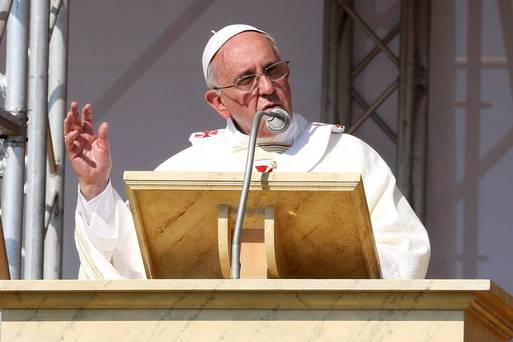|
Pope Francis has unfinished business on abuse
By Michael Kelly
Irish Independent
July 7, 2014
http://www.independent.ie/opinion/comment/pope-francis-has-unfinished-business-on-abuse-30410988.html
 |
| Pope Francis. |
When Pope Francis meets survivors of clerical sexual abuse today it will be the Pontiff's first opportunity to hear of their suffering first-hand. The carefully planned encounter, which takes place in the Vatican guesthouse where the Pope has made his home, will be an opportunity for survivors to underline the fact that church mishandling of complaints against priests compounded their suffering.
Vatican officials see the meeting as a key moment in reassuring survivors that the Vatican and the Pope is determined to continue to act decisively on the issue of abuse. The Pontiff will surely be in listening mode, and survivors are likely to speak not only of their experiences of abuse but also to impress upon the Vatican what still needs to be done.
Everyone acknowledges that in places like Ireland, Britain and the US, the church now has first-rate policies in place to deal with abuse. But there is significant unfinished business that Pope Francis will have to tackle if his strong words on abuse are to be taken seriously.
advertisement
For a start, the church's 'zero tolerance' stance on abuse is undermined by the fact that, while abusive priests are immediately removed and reported to the civil authorities, there has been no meaningful sanction taken against bishops who have been shown to have covered up abuse.
Strong child protection policies are procedures that are a vital part in the fight against abuse, but these guidelines are only as good as the people responsible for implementing them. As Judge Yvonne Murphy showed in her report into abuse allegations in the Cloyne Diocese, procedures were largely ignored. Bishop John Magee deliberately misled an inquiry and his own advisers by creating two different and contradictory accounts of a meeting with a priest suspected of abusing a child – one for the Vatican and the other for diocesan files. And while Bishop Magee eventually resigned, this was largely due to media and public pressure rather than censure from the Vatican.
Bishop Magee is not an isolated case. In the US, Bishop Robert Finn was charged and found guilty in 2012 of failing to report suspected abuse to the police. He was sentenced to two years probation for his failure to protect children, and yet he continues to lead his Kansas City Diocese and has not been subject to any church penalty.
These incidents expose a weakness in the system on how abuse and its mishandling is dealt with: how does the church respond when bishops or people in authority in the church fail to act to protect children? In canon law, it is a crime for a bishop to be negligent in supervision. Yet, until a bishop or religious superior is held to account for abuse failings, talk about accountability sounds hollow to survivors. The signs are hopeful. In appointing Irish abuse survivor and campaigner Marie Collins to the Vatican body responsible for abuse prevention strategies, the Pope has ensured that the voice of survivors is centre-stage. However, Francis will also have to face down those in the church who do not see abuse as an issue.
Another challenge for the Pontiff will be ensuring that the heightened awareness of child safeguarding that exists in the church in countries like Ireland takes root in the developing world. Some bishops in parts of the developing world – where the Catholic population is rising dramatically – have been slow to accept that robust child protection policies is a priority. By meeting with survivors and shedding light on their experiences, the Pope can keep the issue top of the agenda for the world's bishops.
Pope Francis's popularity has been staggering since his election in 2013.
Clerical sexual abuse has not dogged his papacy in the same way it cast a long shadow over the tenure of his predecessor Benedict XVI. However, the Pontiff's advisers would be foolish to think that this means it is no longer a major issue for the church. The goodwill shown to Francis, including by many people who have been hostile to the church in the past, will quickly evaporate if he takes his eye off the ball. The church has to demonstrate seriousness on the issue of accountability by addressing the need to punish not just abusers but also those who failed in their duty to protect children. How that punishment is meted out will be a key challenge for Pope Francis.
|
